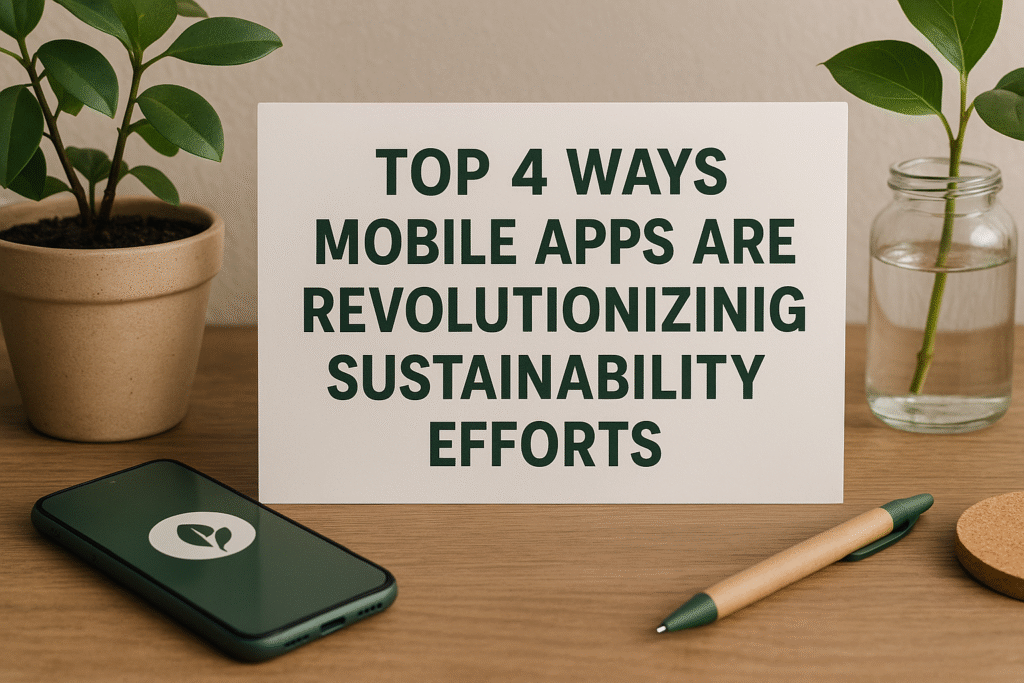In an era increasingly defined by environmental consciousness and the urgent need for sustainable practices, mobile applications have emerged as powerful tools for driving positive change. Far beyond mere digital conveniences, apps are now at the forefront of revolutionizing sustainability efforts, empowering individuals, communities, and industries to adopt greener habits and more efficient resource management. For a Mobile App Development USA firm, recognizing and integrating sustainability-focused functionalities can open new markets and align with growing consumer values.
Here are four key ways mobile apps are revolutionizing sustainability efforts:
1. Empowering Individual Behavioral Change
One of the most direct and impactful ways mobile apps contribute to sustainability is by directly influencing individual behavior. By providing personalized insights, educational content, and engaging challenges, these applications nudge users towards more eco-friendly lifestyles.
- Personal Carbon Footprint Tracking: Apps allow individuals to calculate, monitor, and reduce their environmental impact. By inputting data on daily activities like transportation, energy consumption, food choices, and waste generation, users receive a tangible measure of their carbon emissions. This awareness is the first step towards behavioral modification. Apps might offer personalized tips, suggest sustainable alternatives, or highlight areas where the user can make the most significant reductions. For instance, an app might show how switching from driving to cycling for a short commute impacts carbon output, or how adopting a plant-based meal reduces one’s dietary footprint.
- Gamification for Green Habits: To make sustainability engaging and maintain user motivation, many apps incorporate gamification elements. Users can earn points, badges, or virtual rewards for completing eco-friendly challenges, such as reducing shower time, unplugging electronics, or choosing reusable items. Some innovative apps even link virtual achievements to real-world impact, for example, by planting actual trees based on user engagement. This playful approach transforms abstract environmental goals into achievable, rewarding actions.
- Education and Awareness: Apps serve as accessible platforms for environmental education. Through interactive quizzes, articles, infographics, and videos, they simplify complex ecological concepts, raise awareness about pressing environmental issues (like plastic pollution or biodiversity loss), and suggest actionable steps. This continuous learning fosters a deeper understanding and commitment to sustainable living, transforming passive users into informed advocates.
- Sustainable Lifestyle Recommendations: Beyond tracking, apps offer practical advice for everyday living. They might suggest local eco-friendly businesses, provide recipes for reducing food waste, guide users on responsible consumption, or offer tips for home energy conservation. By making sustainable choices convenient and understandable, apps remove barriers to adoption.
2. Facilitating the Circular Economy and Waste Reduction
Mobile applications play a crucial role in promoting the principles of the circular economy, which aims to minimize waste and maximize resource utilization. They connect individuals and businesses, enabling sharing, recycling, and responsible disposal, thereby diverting waste from landfills and extending the life cycle of products.
- Food Waste Reduction: Apps are highly effective in combating food waste, a significant contributor to greenhouse gas emissions. Platforms connect consumers with local restaurants, cafes, and grocery stores offering surplus food at discounted prices before it gets discarded. Other apps facilitate direct peer-to-peer sharing of surplus food among neighbors, ensuring edible food finds a home instead of going to waste. These initiatives not only reduce environmental impact but also address food insecurity.
- Recycling and Proper Disposal Guidance: Navigating local recycling rules can be complex. Apps provide comprehensive guides on how to recycle various materials, identify nearby recycling centers, or even schedule specialized waste pickups. Some allow users to scan product barcodes to determine recyclability or provide information on eco-friendly disposal methods for challenging items like electronics or batteries.
- Second-Hand Economy and Sharing Platforms: Mobile marketplaces dedicated to second-hand goods, clothes, or household items promote reuse and reduce the demand for new production, conserving resources. Similarly, apps for lending or borrowing tools, equipment, or even skills among communities foster a sharing economy, minimizing individual ownership and maximizing resource utilization.
- Litter and Pollution Monitoring (Citizen Science): Apps empower citizens to become environmental stewards by reporting litter, pollution incidents, or illegal dumping. Through geo-tagging and photo uploads, users can contribute to vast databases that help authorities and environmental organizations identify problem areas, track pollution sources, and coordinate clean-up efforts. This form of “citizen science” provides invaluable data for research and policy-making.
3. Optimizing Resource Management in Industries and Homes
Mobile apps, often integrated with Internet of Things (IoT) devices and data analytics, are revolutionizing resource management across various sectors, leading to significant reductions in energy, water, and material consumption.
- Smart Home Energy Management: Apps connected to smart thermostats, lighting systems, and appliances enable homeowners to monitor and control their energy consumption remotely. They provide real-time data on usage patterns, offer insights into energy-saving opportunities, and allow for automated scheduling to optimize power use, leading to reduced electricity bills and a smaller carbon footprint.
- Precision Agriculture: In the agricultural sector, mobile apps are transforming traditional farming into smart, sustainable practices. Farmers use apps integrated with sensors, drones, and satellite imagery to monitor crop health, soil conditions, and weather patterns. This data-driven approach enables precise irrigation, optimized fertilizer application, and targeted pest control, significantly reducing water usage, chemical runoff, and waste.
- Industrial Efficiency and Supply Chain Optimization: Mobile apps provide businesses with real-time dashboards and analytics for monitoring energy and water consumption in factories, warehouses, and offices. They help identify inefficiencies, optimize operational processes, and predict maintenance needs for machinery, thereby minimizing downtime and resource waste. Furthermore, apps enhance supply chain transparency, allowing companies to track the origin of materials, monitor transportation emissions, and verify ethical sourcing, contributing to more responsible production and consumption.
- Water Conservation: Beyond smart homes, apps help manage water usage in gardens through smart irrigation systems, or track personal water consumption habits, providing tips for reducing daily water footprint. In commercial settings, apps can monitor leaks and optimize water flow in large facilities.
4. Promoting Green Transportation and Sustainable Mobility
Transportation is a major contributor to global emissions. Mobile apps are fundamentally changing how people move, encouraging the adoption of cleaner, more efficient, and shared mobility options, thereby reducing reliance on single-occupancy vehicles and minimizing air pollution.
- Ride-Sharing and Carpooling: Apps facilitate ride-sharing and carpooling, connecting drivers with passengers heading in the same direction. This reduces the number of cars on the road, lowers fuel consumption per person, and alleviates traffic congestion.
- Bike-Sharing and E-Scooter Rentals: The proliferation of bike-sharing and e-scooter rental apps has made sustainable short-distance travel highly accessible. Users can locate, unlock, and pay for bikes or scooters via their smartphones, encouraging active and emission-free modes of transport.
- Public Transportation Navigation: Apps that provide real-time public transportation schedules, route planning, and ticketing options encourage more people to utilize buses, trains, and subways instead of private cars. This shift significantly reduces urban emissions and traffic.
- Eco-Friendly Route Optimization: Many navigation apps now offer options for “eco-friendly” routes, suggesting paths that minimize fuel consumption based on factors like traffic, speed limits, and road gradients. Some even integrate data on public charging stations for electric vehicles, promoting EV adoption.
- Fleet Management and Logistics: For businesses, mobile apps are optimizing logistics and delivery routes, reducing fuel consumption, and cutting down on empty return trips. By enabling real-time tracking, route optimization, and efficient load planning, these apps contribute to a leaner, greener supply chain.
Conclusion
Mobile apps are no longer just tools for entertainment or convenience; they have evolved into powerful catalysts for global sustainability efforts. From empowering individual choices and fostering a circular economy to optimizing industrial processes and transforming transportation, their impact is broad and ever-expanding. For a forward-thinking Mobile App Development USA company, embracing these sustainability-focused avenues represents not only an ethical imperative but also a significant market opportunity to build innovative solutions that address some of the world’s most pressing environmental challenges. As digital transformation continues, mobile applications will undoubtedly remain at the forefront of the movement towards a more sustainable future.



